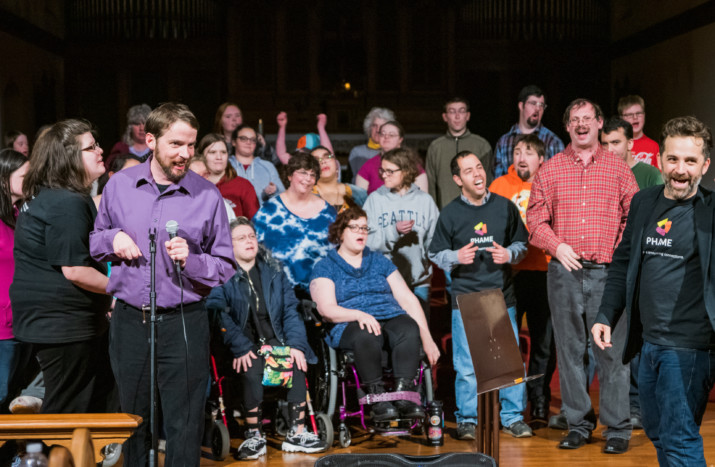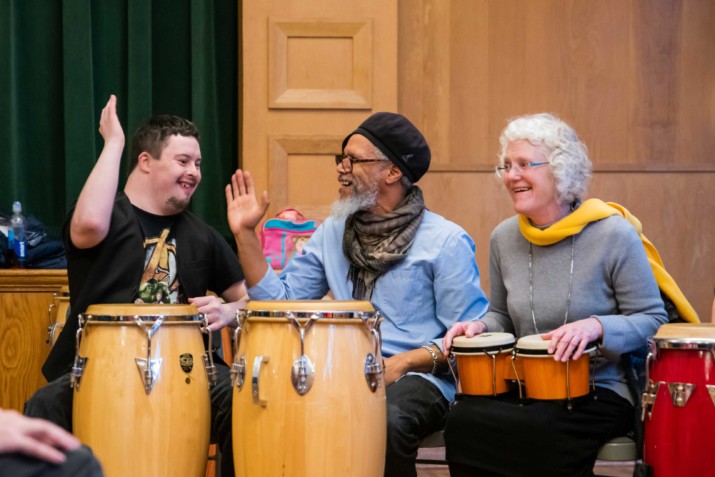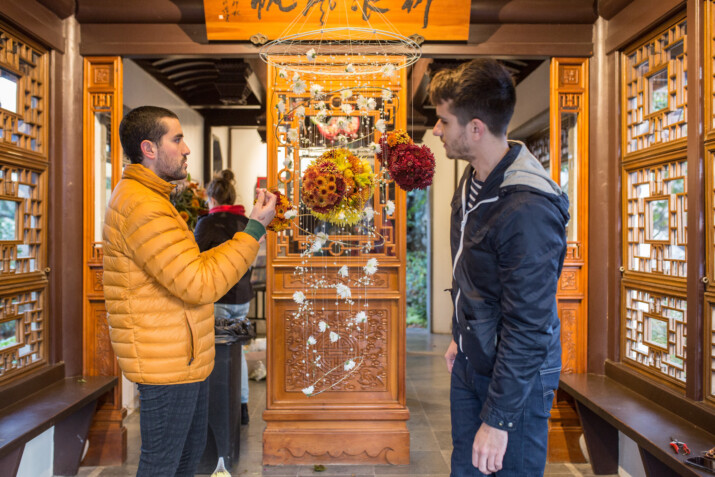Portland, OR. The Kuni Foundation awarded just over $1 million to support 19 projects that advance cancer research and promote vibrancy and inclusion for people experiencing intellectual and developmental disabilities (IDD). Portland-based PHAME, a performance and arts school for people with developmental disabilities, pictured above, received a $25,000 for current programs and a $50,000 grant to help support the planning and development of the region’s first fully accessible community and arts building. The community and arts building will be purpose-built for the needs of people with IDD and other disabilities and will include art studios, classrooms, rehearsal spaces, a kiln room and a black-box theater with an accessible light and sound booth. People without disabilities will also be welcome and rehearsal spaces will be open for use to local organizations.

PHAME was founded in 1984 by a group of families who were interested in creating performance opportunities for adults with intellectual and developmental disabilities.
“Imagination Grants reflect our commitment to investing in people and projects that inspire, innovate and experiment,” said Greg Goodwin, Kuni Foundation Board Chair. “We’re excited about the range of creative approaches expressed in this most recent round of grants.”
Oregon nonprofits received just over $350,000 including three grants to Oregon Health & Science University (OHSU). A $50,000 grant will help launch a Center of Excellence for Autism Research at OHSU.
According to the Centers for Disease Control and Prevention, about one out of every 54 children have been identified with autism spectrum disorder and Autism is the fastest-growing developmental disability. Access to diagnosis and intervention is often delayed and reduced for people of color and those living in remote, rural areas. OHSU has the state’s largest clinical program for the treatment of autism, and the grant will be used to help build capacity, collaboration and expand services through the Center of Excellence for Autism Research.
“This capacity-building grant from the Kuni Foundation will provide us with the launch pad we need to start our Autism Center at a critical time.” Eric Fombonne, M.D., Professor of Psychiatry, OHSU.
OHSU also received $149,000 to advance two cancer research efforts. Dr. Lara Davis, Associate Professor of Medical and Pediatric Oncology and the Director of the Sarcoma Program at the Knight Cancer Center, received $75,000 to pursue better outcomes for women diagnosed with Uterine leiomyosarcoma. This rare and aggressive cancer affects thousands of women each year with a mortality rate of more than 50 percent.
The Leukemia Lymphoma Society (Oregon) received $50,000 for research to improve diagnosis and treatment for Multiple Myeloma, with an emphasis on improving access and outcomes for African Americans. The risk for Multiple Myeloma increases with age, and with the population in the United States steadily aging, the incidence of new diagnoses is expected to increase by 60 percent over 20 years (2010 to 2030). Nearly 13,000 Americans die from Multiple Myeloma each year; African Americans are more than twice as likely to receive a diagnosis, and at a younger age.
Expanding Housing Access in Washington
A new co-housing model in Shoreline, Washington led by Community Homes, Inc. received $50,000 to help plan an inclusive community for people who experience IDD. The nonprofit provides affordable and supportive housing, in addition to navigation and support.
Open Doors for Multicultural Families provides culturally and linguistically relevant information, services, and programs to culturally diverse people experiencing IDD. Based in Redmond, Washington, the organization received a $50,000 planning grant to support a new housing effort.
“People experiencing disabilities are the drivers of the planning, design, and development of the Multicultural Village housing project, said Ginger Kwan, Executive Director of Open Doors for Multicultural Families. “By gathering their feedback and lifting their voices, we will build options that provide opportunities for homeownership and create a multicultural community center. Kuni Foundation has played a critical role in realizing this vision, planting the seed for this project to grow.”
Ten cancer research initiatives received just over $700,000 for efforts ranging from treatments for brain and bladder cancers to the use of artificial intelligence. Christoph Lee, MD, MS, MBA, and professor of Radiology at the University of Washington (UW) School of Medicine received $75,000 for the regional expansion of artificial intelligence-driven breast cancer screenings.
Here are more specifics:
Oregon Grants ($356,988):
Grace Commons Consortium, Portland: Pre-Development for Community Arts Building, $50,000
Home Life, Corvallis: Quality Assurance Program $7,000
Leukemia Lymphoma Society: Improving Targeted Adoptive Cell Therapy of Myeloma, $75,000
Lara Davis, MD, OHSU: Circulating Tumor DNA as a Non-Invasive Method for Monitoring Uterine Leimyosarcoma, $75,000
Eric Fombonne, MD, OHSU: Building an Autism Center of Excellence, $50,000
Adel Kardosh, MD, OHSU: ctDNA Biomarker to Improve Organ-Preserving Strategies for Colon Cancer Patients, $74,988
PHAME, Portland: PHAME Program Expansion, $25,000
Washington Grants ($700,000)
Arc of Spokane: Person-Centered Approach to Community Advocacy, $25,000
Autism Empowerment of Vancouver: Multi-Media Resources, $25,000
Community Homes, Inc.: Shoreline Co-Housing Project, $50,000
Open Doors for Multi-Cultural Families: Housing Planning Grant, $50,000
People First for Washington: Coalition Building for Self-Advocates, $25,000
Brittany Barber, MD, UW Washington: Why Young Patients with No Risk Factors are Developing Oral Tongue Squamous Cell Carcinoma, $75,000
Eleanor Chen, MD, UW Medicine: Therapeutic Target and Biomarker Discovery for Adult Rhabdomyosarcoma, $75,000
Meghan Flanagan, MD, UW Medicine: Using Spatial Genomics to Predict Progression of Lobular Carcinoma In Situ to Invasive Breast Cancer, $75,000
Andrew Ko, MD, UW Medicine: Developing New Brain Cancer Treatments through Measurement and Modulation of Neural Activity, $75,000
Ming Lam, MD, UW Medicine: Defining Bladder Cancer Metastasis at a Single Cell Resolution for Therapeutic Discovery, $75,000
Christoph Lee, MD, UW Medicine: Regional Expansion of Artificial Intelligence-Driven Breast Cancer Screenings, $75,000
Brent Wise, MD, UW Medicine: Predicting Medication-Resistant and Atypical Pituitary Adenomas Using a Cell-Free DNA Approach, $75,000
About the Kuni Foundation:
Based in Vancouver, Washington, the Kuni Foundation funds cancer research and supports programs and initiatives that enhance the lives of adults who experience intellectual and developmental disabilities. Learn more at www.kunifoundation.org or via Twitter: @KuniFoundation.
















